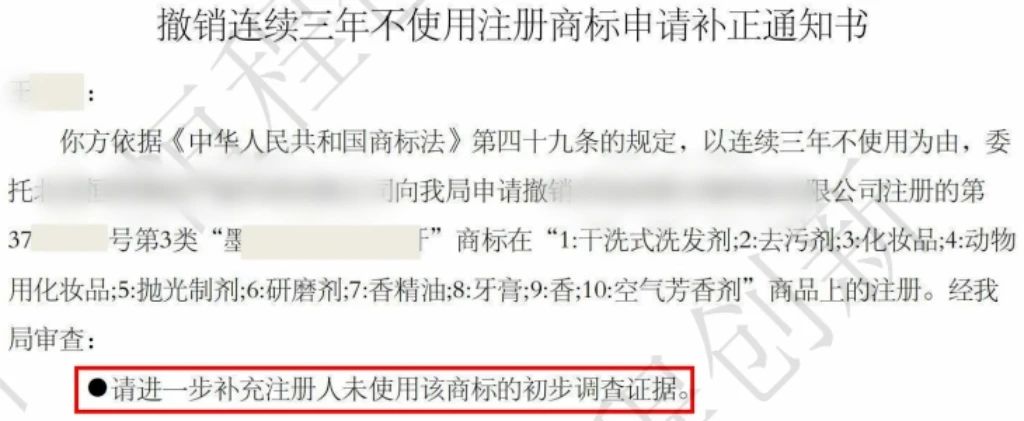The China National Intellectual Property Administration (CNIPA) has recently issued rectification notices to non-use cancellation applications. This initiative aims to enhance the standards for filing cancellation requests and prevent arbitrary submissions.
According to the rectification notice, applicants are now required to present preliminary evidence indicating that the registered trademark has not been utilized in the market for a period exceeding three years. The evidence must include searches conducted across at least three different platforms, with each search engine screenshot providing adequate information. Additionally, applicants are expected to furnish preliminary details about the registrant, including their business scope and operational status, among other relevant information.

Background
Brand owners aiming to enter or expand their trademark portfolios in China understand the complexities involved in obtaining trademark registrations. This is especially true given the growing number of existing registrations that may be identical or similar, making the trademark landscape quite competitive.
Historically, brand owners have viewed non-use cancellations as an effective approach to streamline the registration process. This preference can be attributed to two main factors: first, the costs involved in collecting initial evidence of non-use for conflicting prior registrations are generally lower than those required for oppositions and invalidations. Second, the CNIPA has traditionally been cautious about accepting letters of consent or coexistence agreements.
However, the simplicity of filing non-use cancellations has led to the emergence of malicious third parties who exploit this process by targeting legitimate trademark registrations. This situation not only places a considerable burden on brand owners to defend against unjustified challenges but also increases the workload for the CNIPA.
CNIPA Revised Guidelines Regarding Non-Use Cancellations
Starting in early 2025, the CNIPA has begun issuing Office Actions regarding non-use cancellations, which include updated evidential standards for submissions.
Registrant Information: Applicants seeking non-use cancellations must provide essential details about the Registrant, such as their business or operational scope, current operational status, and trademark registration status, among other relevant information.
Investigation Report and Business Evidence: If the Registrant is operational, Applicants are required to submit an investigation report along with evidence demonstrating the Registrant's product sales or service offerings, as well as details about their business or office premises.
Evidence of Non-Use: Applicants must also provide search results and evidence of the target registration from various online platforms or industry-specific websites related to the registered goods or services. This evidence should include continuous full-page screenshots from the first five pages of at least three different platforms.
Practical Advice for Brand Owners
The recent updates seem to have been introduced to establish a more equitable framework regarding the burden of proof in non-use cancellation proceedings. This initiative seeks to reduce frivolous and malicious filings while ensuring that brand owners have a dependable method for maintaining their trademark registrations. These changes align with Article 66 of the Regulations for the Implementation of the Trademark Law of the People’s Republic of China, which requires applicants to provide "relevant facts of the circumstances" when filing non-use cancellation requests.
As of now, CNIPA has not released any official notices or guidance regarding these updated requirements, leaving some uncertainty about their universal application to non-use cancellation applications. It is anticipated that the CNIPA may refine or offer additional guidance on these matters in the future.
In the meantime, here are some helpful tips and insights to assist the client in meeting the current requirements:
Registrant's Basic Information: For corporate registrants, you can utilize information from the National Enterprise Credit Information Publicity System. Please be aware that similar data may not be available for individual registrants.
Investigation Report and Evidence of the Registrant’s Business and Premises: The CNIPA has indicated that additional clarification on this requirement may be provided soon. In the meantime, it is recommended to submit readily available evidence online, such as the registrant's address sourced from Baidu Map.
Evidence of Non-Use from Online Platforms or Industry-Specific Websites: Relevant online platforms include Baidu, Xiaohongshu (Rednote), and Douyin (the Chinese equivalent of TikTok). For industry-specific websites, you might consider using Taobao, JD.com, Dazhong Dianping, or Meituan, as appropriate.
Looking forward
From the perspective of brand owners, the process of initiating non-use cancellation proceedings in China has become somewhat more complex compared to jurisdictions such as South Korea and Japan, where evidence of non-use is not required. However, the updated evidentiary standards in China remain less demanding than those in places like Hong Kong and the United States. Consequently, the costs associated with managing non-use cancellations in China are not anticipated to rise significantly.
Brand owners can feel optimistic about their efforts to enter the Chinese market. This development is a positive step forward, as it offers a potential solution to help mitigate the challenges brand owners encounter when defending their trademark registrations against unfounded or malicious non-use cancellation claims.
